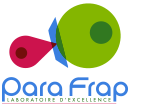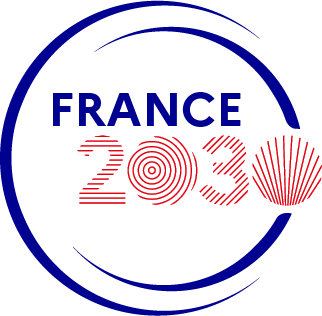

 |
Fabrice LAURENT |
|
|
Information |
||
| Infectiology and Public Health UMR1282 INRA-Tours Univ | ||
| Apicomplexa and Mucosal immunity (AIM laboratory) | ||
| Tours/Nouzilly | ||
| 0000-0002-9687-7952 | ||
| This email address is being protected from spambots. You need JavaScript enabled to view it. | ||
| https://www6.val-de-loire.inrae.fr/infectiologie-santepublique_... | ||
| @FabriceLaurent0 | ||
|
Scientific interests and projects |
||
|
General scientific interests: Apicomplexa and Mucosal Immunity (AIM) team is working on two apicomplexan parasites with intestinal tropism, Cryptosporidium and Eimeria. Historically our research on cryptosporidiosis mainly concerned investigations on the protective and pathological immune responses. However, we extend our researches and recently start to characterize the molecular mechanisms that govern Cryptosporidium/intestinal epithelial cell interactions and the long term consequences of the infection on intestinal homeostasis and immune disorders. In man and farm animals, cryptosporidiosis is poorly controlled and we wish to combine two complementary strategies for an efficient control of the disease. Based on strong dependence of functional immune responses for controlling Cryptosporidium we wish to develop immunostimulatory strategies dedicated to neonates in order to strengthen their ability to limit parasite growth. Drug therapies are limited both in human and livestock, we therefore aim to develop new potent molecules to control parasite development. Scientific activities to be developed in the framework of Parafrap: II- Gut physiopathology: Infection of young individuals by C. parvum induces a long-term defect on intestinal gut physiology and this has been linked to the occurrence of Irritable Bowel Syndrome (IBS). We plan to investigate the contribution of Paneth cells (PC) and their antimicrobial peptides on the onset of this intestinal disorder. III- Control strategies: In collaboration with several international teams including Ali Hakimi’s team from Parafrap with whom we recently identified a first promising target (CPSF3) we wish to further develop our therapeutic arsenal against Cryptosporidium, from drug screening to molecular target identification and in vivo final validation (rodent and large animal models). |
||
|
Top 5 publications of the last 5 years |
||
|
1. C. Swale, A. Bougdour, A. Gnahoui-David, J. Tottey, S. Georgeault, F. Laurent, A. Palencia and Mohamed-Ali Hakimi, Metal-captured inhibition of pre-mRNA processing activity by CPSF3 controls Cryptosporidium infection Science Translational Medicine, 11(517): eaax7161. doi: 10.1126/scitranslmed.aax7161 2. Potiron L, Lacroix-Lamandé S, Marquis M, Levern Y, Fort G, Franceschini I, Laurent F. Batf3-Dependent Intestinal Dendritic Cells Play a Critical Role in the Control of Cryptosporidium parvum Infection. J Infect Dis. 2019 Feb 23;219(6):925-935. doi: 10.1093/infdis/jiy528 3. Diallo MA, Sausset A, Gnahoui-David A, Silva ARE, Brionne A, Le Vern Y, Bussière FI, Tottey J, Lacroix-Lamandé S, Laurent F, Silvestre A. Eimeria tenella ROP kinase EtROP1 induces G0/G1 cell cycle arrest and inhibits host cell apoptosis. Cellular Microbiology. 2019 Jul;21(7):e13027. doi: 10.1111/cmi.13027. 4. Riba A, Olier M, Lacroix-Lamandé S, Lencina C, Bacquié V, Harkat C, Gillet M, Baron M, Sommer C, Mallet V, Salvador-Cartier C, Laurent F, Théodorou V, Ménard S. Microbiota dysbiosis induced by defect of Paneth cells triggers visceral hypersensitivity in mice. Gastroenterology. 2017 Dec;153(6):1594-1606.e2. doi: 10.1111/cmi.12632. 5. de Sablet T, Potiron L, Marquis M, Bussière FI, Lacroix-Lamandé S, Laurent F. Cryptosporidium parvum increases intestinal permeability through interaction with epithelial cells and IL-1β and TNFα released by inflammatory monocytes. Cell Microbiol. 2016 Dec;18(12):1871-1880. 10.1111/cmi.12632. |
||
The INSERM workshop “Modern methods in molecular parasitology” will take place in Montpellier, France, from 4–6 November 2026. This event will bring together leading experts in...
The 15th CAPF (French Anti-Parasitic and Anti-Fungal Consortium) workshop will take place on 16–17 March 2026 in Strasbourg (France). This event is an excellent opportunity for students and postdoctoral researchers to participate and contribute...
Call for Applications: New Junior Research Groups at Institut Pasteur The Institut Pasteur has launched an international call to recruit new junior group leaders.This is a unique opportunity for high-potential scientists to...
JOB : Ingénieur·e d’étude / Research Engineer – Mosquito Immunity (IBMC, Strasbourg) 🇫🇷 Le laboratoire Mosquito Immune Responses recrute un·e ingénieur·e d’étude à l’IBMC (Strasbourg). La personne recrutée sera en...
Applications are now open for the 2026 Biology of Parasitism (BoP) course, taking place June 12–July 23, 2026 at the Marine Biological Laboratory in Woods Hole, MA.This intensive 6-week program offers PhD students and postdocs advanced training in...
Newcastle University offers a full-time, fixed-term position (3 years) for a Research Assistant or Research Associate in Molecular Parasitology — funded by the Medical Research Council (MRC). About the Opportunity Location:...
Multidisciplinary PhD opportunity in the fields of infectious diseases, gene regulations and molecular signalisation. Fully Funded 4-Year PhD at the University of York A fully funded PhD opportunity is available at the...
The EMBO Workshop 2025 “Host–Parasite Relationship: From Mechanisms to Control Strategies”, took place from October 5–8, 2025, on the beautiful Île des Embiez (France). Organized within the framework of the LabEx ParaFrap and...
Postdoc (M/F) in molecular and biochemical parasitology (Toxoplasma gondii) A 24-month post-doctoral position starting on January 2026 and funded by the French National Research Agency (ANR) is available in the in the...
Postdoc (M/F) Molecular and cell biology in Trypanosoma brucei A 24-month post-doctoral position starting on November 1st 2025 (or before) and funded by the French National Research Agency (ANR) is available in the...

© 2023. All rights reserved MLCOM
Notre site LabEx ParaFrap utilise des cookies pour réaliser des statistiques de visites, partager des contenus sur les réseaux sociaux et améliorer votre expérience. En refusant les cookies, certains services seront amenés à ne pas fonctionner correctement. Nous conservons votre choix pendant 30 jours. Vous pouvez changer d'avis en cliquant sur le bouton 'Cookies' en bas à gauche de chaque page de notre site. En savoir plus
Ce site utilise des cookies pour assurer son bon fonctionnement et ne peuvent pas être désactivés de nos systèmes. Nous ne les utilisons pas à des fins publicitaires. Si ces cookies sont bloqués, certaines parties du site ne pourront pas fonctionner.
Ce site utilise des cookies de mesure et d’analyse d’audience, tels que Google Analytics et Google Ads, afin d’évaluer et d’améliorer notre site internet.
Ce site utilise des composants tiers, tels que NotAllowedScript699318e4bf1deReCAPTCHA, Google NotAllowedScript699318e4beeeeMaps, MailChimp ou Calameo, qui peuvent déposer des cookies sur votre machine. Si vous décider de bloquer un composant, le contenu ne s’affichera pas
Des plug-ins de réseaux sociaux et de vidéos, qui exploitent des cookies, sont présents sur ce site web. Ils permettent d’améliorer la convivialité et la promotion du site grâce à différentes interactions sociales.
Ce site web utilise un certain nombre de cookies pour gérer, par exemple, les sessions utilisateurs.

